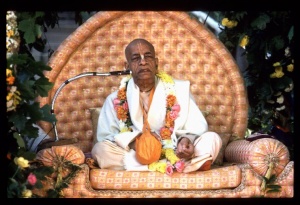SB 4.19.32

A.C. Bhaktivedanta Swami Prabhupada
TEXT 32
- pṛthu-kīrteḥ pṛthor bhūyāt
- tarhy ekona-śata-kratuḥ
- alaṁ te kratubhiḥ sviṣṭair
- yad bhavān mokṣa-dharma-vit
SYNONYMS
pṛthu-kīrteḥ — of wide renown; pṛthoḥ — of King Pṛthu; bhūyāt — let it be; tarhi — therefore; eka-ūna-śata-kratuḥ — he who performed ninety-nine yajñas; alam — there is nothing to be gained; te — of you; kratubhiḥ — by performing sacrifices; su-iṣṭaiḥ — well performed; yat — because; bhavān — yourself; mokṣa-dharma-vit — the knower of the path of liberation.
TRANSLATION
"Let there be only ninety-nine sacrificial performances for Mahārāja Pṛthu," Lord Brahmā concluded. Lord Brahmā then turned towards Mahārāja Pṛthu and informed him that since he was thoroughly aware of the path of liberation, what was the use in performing more sacrifices?
PURPORT
Lord Brahmā came down to pacify King Pṛthu regarding his continual performance of one hundred sacrifices. King Pṛthu was determined to perform one hundred sacrifices, and King Indra took this very seriously because Indra himself was known as the performer of one hundred sacrifices. Just as it is the nature of all living entities within this material world to become envious of their competitors, King Indra, although King of heaven, was also envious of King Pṛthu and therefore wanted to stop him from performing one hundred sacrifices. Actually there was great competition, and King Indra, to satisfy his senses, began to invent so many irreligious systems to obstruct King Pṛthu. To stop these irreligious inventions, Lord Brahmā personally appeared in the sacrificial arena. As far as Mahārāja Pṛthu was concerned, he was a great devotee of the Supreme Personality of Godhead; therefore it was not necessary for him to perform the prescribed Vedic ritualistic ceremonies. Such ceremonies are known as karma, and there is no need for a devotee in the transcendental position to execute them. As the ideal king, however, it was King Pṛthu's duty to perform sacrifices. A compromise was therefore to be worked out. By the blessings of Lord Brahmā, King Pṛthu would become more famous than King Indra. Thus Pṛthu's determination to perform one hundred sacrifices was indirectly fulfilled by the blessings of Lord Brahmā.